Rubymar Sinking Puts Coral Reefs At Risk
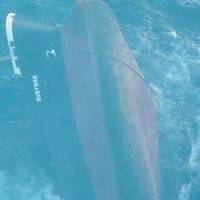
When the Rubymar sank in the Red Sea after a Houthi attack, the ship went down carrying 21,000-tonnes of fertiliser which could trigger massive algal blooms that could create "dead zones" for marine life and starve coral reefs of light.Alongside a slick of leaking fuel, the ammonium phosphate sulphate fertilisers could deliver an extreme pulse of nutrients into waters harbouring rare corals, marine mammals and reef fish, creating a spread of foamy scum on the water.According to a maritime warning circulated to ships in the area…
Metal Shark Delivers Two Fireboats to Miami-Dade Fire Rescue
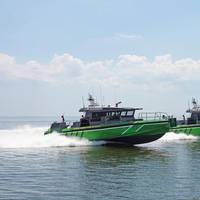
Shipbuilder Metal Shark has delivered two of three new welded-aluminum “50 Defiant” monohull pilothouse fireboats to Miami-Dade Fire Rescue (MDFR).Designed by Metal Shark’s in-house engineering team and built to Lloyds Registry Standard, the welded-aluminum monohull pilothouse fireboats “FB-21” and “FB-73” were acquired to boost MDFR’s maritime firefighting capability and will replace existing vessels in its fleet.Compared to MDFR’s outgoing vessels, the new 55’ x 17.5’ Metal Shark fireboats offer faster speeds enabling shorter response times…
Stena Line is 10 Years Ahead of IMO Emissions Goals
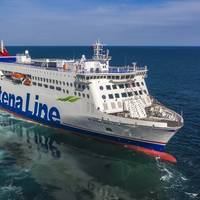
Ferry shipping company Stena Line reports it is 10 years ahead of international shipping's emissions reduction targets thanks to measures such as new, larger and more energy efficient vessels, AI assisted captains and an increased punctuality.The Sweden-based operator says that during 2019 it reduced its total CO2 emissions 1.7 %, corresponding to 24,000 metric tons of CO2 in total, while CO2 emissions per transported ton freight and passenger vehicles on board the vessels fell…
Concor Begins Maiden Coastal Voyage
India has huge potential for enhancing modal share of coastal shipping and inland water navigation. The current share is only 7% unlike countries like China with 24% and Germany 11%. India looks to tap this segment in a big way.The maiden coastal voyage of a vessel of Container Corporation of India (Concor) was flagged off by Nitin Gadkari, Union Minister for Shipping and Piyush Goyal, Union Minister for Railways.CONCOR is a public sector unit (PSU) under Ministry of railways. The vessel SSL Mumbai is sailing from Kandla Port to Tuticorin via Mangalore and Cochin. This is a unique example of multi-modal logistics solution through integrated rail and coastal movement.
Preventing Maritime Vessel Explosions – The Role of the Marine Chemist
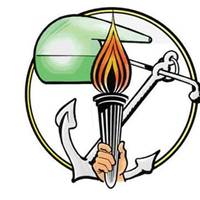
With advances in technology, increased regulatory requirements for training, and an industry that has been committed to improving working conditions, especially those associated with confined space entry and fire prevention, why are we still seeing maritime related fires and explosions that often include serious injury or loss of life? HistoryFollowing the First World War, as cargo vessels, particularly tank ships, were being converted to carry larger cargos, the incident rate of fires and explosions during shipbuilding, repair, and conversion began to rise.
India to Boost Coastal Shipping
The Indian ministry of shipping has taken several significant steps to boost and develop coastal shipping as the most efficient mode of transportation of cargo."The country believes that development of coastal shipping will facilitate movement of cargo through inland water transport to coast and vice-versa, which is cheapest way of transport,"said the Minister of State for Road Transport & Highways, Shipping and Chemicals & Fertilizers Mansukh L Mandaviyainan.This would also result in diversion of cargo from rail/ road to sea route.At present, transportation of cargo through coastal shipping is significantly lower than by road or rail transport.As per study, the cost of per ton cargo movement per KM by road is Rs. 2.50/, by rail is Rs. 1.36/- while by water route, it is Rs.
Greener Anti-Fouling Solutions Attract Shipping Industry Interest
The four-year SEAFRONT project, launched in 2014, has trialled new processes and methods designed to increase scientific understanding of exactly how biofouling occurs and how this problem can best be addressed. This initial work will help in the development of a new generation of anti-biofouling technologies, which will be able to effectively minimise biofouling on marine infrastructure and tools without damaging the ecosystem. ‘Although it is still a little early to report on concrete results, we have already received interest from a number of companies looking for innovative antifouling solutions for their boats, stationary applications, fishing nets and cables,’ says SEAFRONT project coordinator Dr Arie Brouwer from the Stichting Dutch Polymer Institute in the Netherlands.
Chemical-free BallastMaster Certified by DNV GL
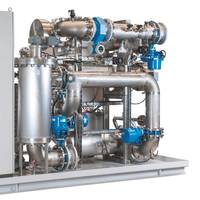
The GEA Westfalia Separator Group received Class Approval from the DNV GL (Det Norske Veritas Germanischer Lloyd) in December 2014 for its ballast water management system BallastMaster ultraV 250. With this system, the chemical-free system solution for ballast water treatment fulfils all current D-2 standards of the International Maritime Organization (IMO). The certificate documents that BallastMaster ultraV 250 has been designed and produced according to the highest standards of the branch and guarantees the greatest possible operational safety…
Protection of the Arctic Environment High on the IMO Agenda
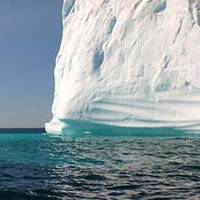
The IMO Subcommittee on Ship Design and Equipment (DE) has made progress in its efforts to develop international environmental and safety regulations for navigation in polar regions. For the recent session of the Subcommittee on Ship Design and Equipment held in March 2013, Denmark had, together with other Arctic coastal States, submitted a proposal for a special chapter on marine environment regulations for the Polar Code. The Polar Code is a special set of regulations that ships must comply with to navigate polar waters.
ACT 2 Sludge Devouring Device Installed in Drill Ship
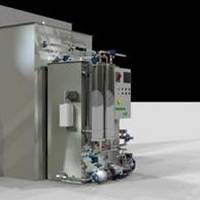
A Marine Sanitation Device (MSD) by ACT2 Technologies, of Ft. Lauderdale Florida has been fitted to Transocean's 'Discoverer Enterprise'. The Discoverer Enterprise is leased to BP and owned by Transocean. ACT2 say that they are also working on additional units for Transocean in the 200 person range. BP, Transocean, and ACT2 Technologies are committed to reducing sanitation pollution to zero while existing 159(55) regulations still allow many pollutants to be discharged.
Hull Cleaning Solutions from Subsea
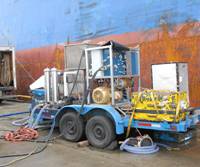
Subsea Solutions Alliance begins Environmentally Friendly Hull Cleaning. The global shipping industry remains stuck between international and regional regulatory requirements and efficient cost effective ship operations. Environmentalists continue to keep ships in the spotlight by focusing their attacks on the air pollution produced by ships. Regional and local port authorities remain focused on keeping their waters free of invasive species and metals like copper, nickel and other harmful chemicals potentially released during routine hull maintenance cleaning and propeller polishing.
Wärtsilä and Ecospec Co-operate on Clean Power Solutions
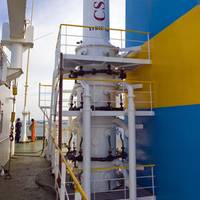
Wärtsilä and Ecospec Global Technology, owner of the CSNOx emissions abatement technology, recently signed a Memorandum of Understanding (MOU) to work together towards the common goal of improving the environment by providing the world with clean power solutions. By combining the joint expertise of Wärtsilä and Ecospec, the carbon footprint of both marine and onshore heavy industries can be significantly reduced through the development of clean power solutions. The aim is to achieve the lowest possible CO2 emissions…
CSL, Ecospec Reduce Great Lakes Emissions
Canada Steamship Lines (CSL), has signed a Letter of Intent with ECOSPEC Marine Technology wherein both parties will work together to develop and install CSNOx technology within the CSL fleet, thus bringing revolutionary ecological technology to the Great Lakes in its ongoing search for solutions in improving the marine industry’s environmental footprint. The partnership announcement was made by CSL President, Gerry Carter, at Green Marine’s “Green Tech for Shipping 2010” conference held in Montreal, Canada, May 2010. CSL and Ecospec plan on installing the award winning CSNOx system on one of CSL’s Great Lakes’ vessel later this year in order to validate and obtain certification of the performance and efficiency of the system in a fresh water environment…
MEP Signs Agreement with Marmex
Marine Environmental Partners, Inc. (MEP), a West Palm Beach-based developer of ballast and waste water sanitation systems has signed a cooperative agreement with Finnish marine product and services company, Marmex. Based in Mariehamn, Marmex represents MEP's MariSan™ ballast water process treatment systems in Finland. The MariSan™ ballast water systems comply with the most stringent worldwide environmental regulations. Utilizing electro-ionization as the core treatment methodology, the MariSan™ systems produce effluents that are free from harmful chemicals, bacteria or invasive species. Fully automated, this unique technology is cost-effective to purchase, operate and maintain.
Bioremediation Products Demonstrated to USCG
The U.S. Coast Guard recently received a demonstration of two Spillaway brand bio-remediation products, which contain live bacteria or spores that "eat" oil and fuel. Spillaway products are distributed by MEM International. Bio-remediation uses naturally occurring microorganisms to degrade harmful chemicals into non-toxic compounds. Microorganisms break down a wide variety of organic compounds that are found in nature to obtain energy for their growth. In particular, these organisms will break down petroleum hydrocarbons and transform them into carbon dioxide and water. Bio-remediation harnesses this natural process by promoting the growth of microorganisms that can degrade contaminants and convert them into non-toxic by-products. The bio-remediation process is natural.









